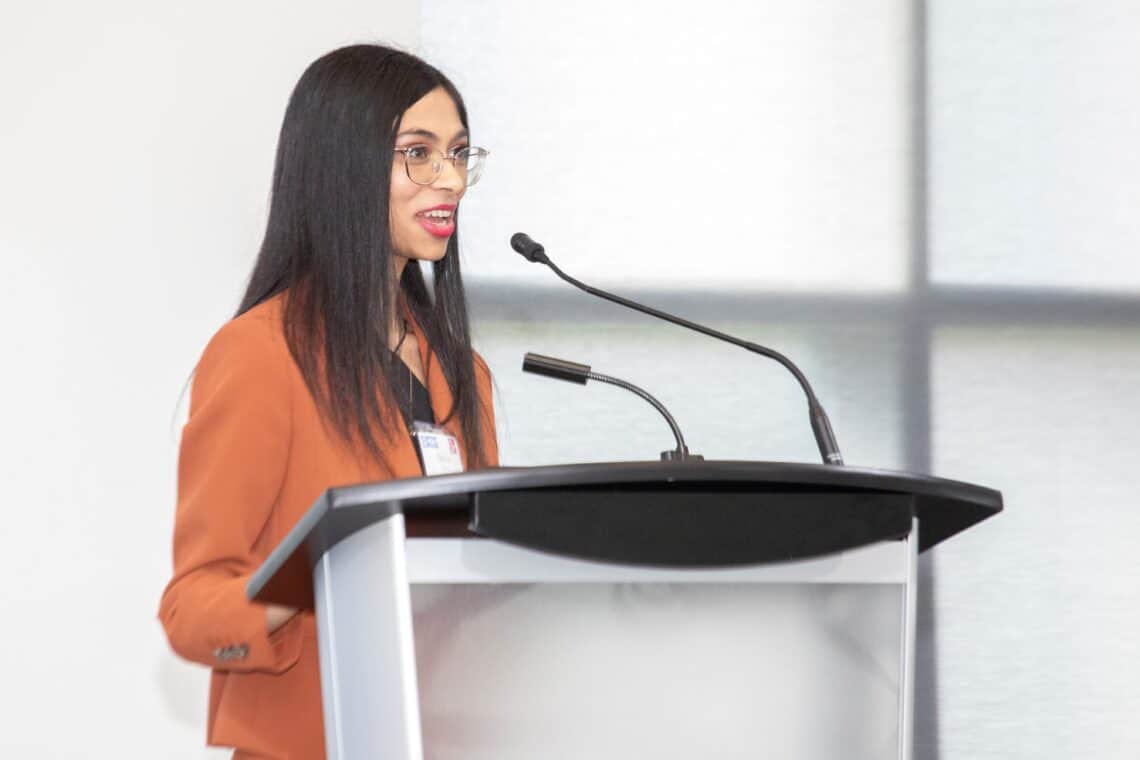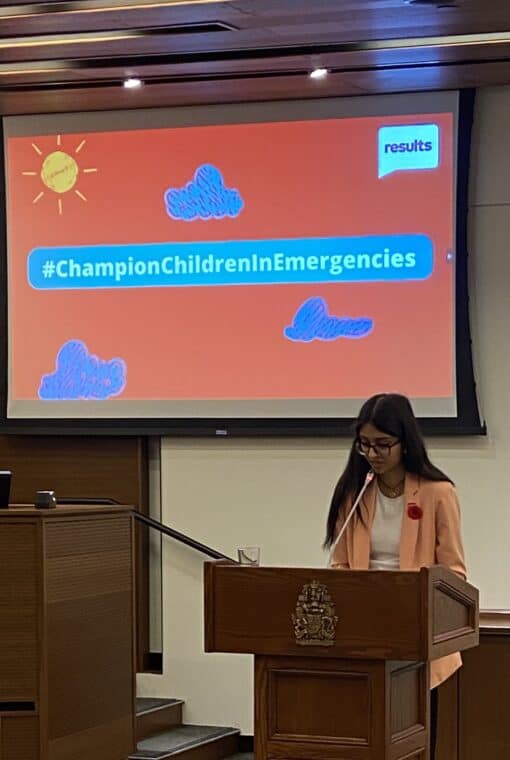The equitable representation of women in the workforce, especially in leadership, has great potential to improve all sectors, and the charitable sector is uniquely positioned to advance gender equality. Together, there is a lot that organizations across sectors can do, but directing support toward girls and young women stands out as a wise investment in sustainable change.
Many organizations in Canada are missing out on a source of great potential: more women in the workforce – especially in leadership. According to the American Psychological Association, research indicates that women leaders increase productivity, collaboration, dedication, and fairness in the workplace. Yet this year, LinkedIn economists found that women hold only 35% of leadership positions in Canada and less than 33% globally, even when they make up about half the population. Change is happening slowly, with only a 1% increase in the past seven years globally, and the World Economic Forum tells us that women will continue to experience inequality for another 131 years if things remain as they are.
This needs to change, and the charitable sector in Canada is uniquely positioned to support women, starting by raising awareness of the example they are setting. According to TD Wealth’s 2023 Trust and Transformation report, 2.5 million (77%) of the 3.5 million people employed in the Canadian charitable sector are women. This majority, supported by inclusive initiatives, has led to a more representative leadership, with numerous women holding executive and board positions. Moreover, this demonstration of women’s effective and engaging leadership has a ripple effect that encourages more opportunities and paths to leadership, furthering equity. It also diversifies society’s image of who can be a leader. “As I’ve seen in my past work and in the research evidence, when leadership reflects the diverse communities we are part of, that cultivates a strong sense of belonging and enables a more gender-equal society,” says Anjum Sultana, director of youth leadership and policy advocacy at global development and humanitarian organization Plan International Canada.
When leadership reflects the diverse communities we are part of, that cultivates a strong sense of belonging and enables a more gender-equal society.
Anjum Sultana, Plan International Canada
Charities have a role to play in calling on other sectors to support greater equity for women in the workplace, not just because it’s the right thing to do, but also because it results in more prosperous societies. Research from 2017 indicates that if we were to narrow the gender gap in Canada, $150 billion could be added to the national gross domestic product by 2026. The potential afforded by an increase in women’s representation in the workforce is great, especially in leadership. As Sultana notes, “When women also have a say in decision-making, we create an environment that harnesses the collective wisdom and talents of a greater part of Canada’s population, and we are all better for it.”
Organizations can address the gender gap in many ways, but engaging youth creates impactful and sustainable change
So, how can charities and other organizations create greater inclusion of women in the workforce and in leadership? And how can we proactively support the next generation of leaders, so they do not encounter gender-based barriers and are set up for success earlier in their careers?
In line with raising awareness about the capability of women and finding synergies across sectors, organizations can continue to evolve their initiatives to level the playing field for women. Equity is encouraged when we adopt practices that promote gender equality such as hiring for skills instead of previously held job titles, offering flexible work arrangements, and creating opportunities that seek to include women. The American Psychological Association suggests that organizations can also proactively identify potential women leaders, support women joining professional organizations that are women-led, and encourage allyship from men. It also highlights the importance of establishing mentorship and sponsorship programs.
There is a strong case to be made for supporting women before they join the workforce – starting from when they are girls and young women. According to Sultana, connecting youth with leadership and equipping them with tools to further their own potential is a crucial starting point.
“Workplace policies help address systemic barriers for women once they reach the workplace,” she says, “but what else can we build on in a proactive manner earlier in life? Supporting young people in all their diversity by promoting intergenerational mentorship, investing in their social capital, fostering exposure to different careers, and co-creating opportunities for them to provide their insights on key ‘wicked challenges’ can support in closing the gender gap in the workplace and builds their confidence, showing them that they belong and have a seat at the table.”
Workplace policies help address systemic barriers for women once they reach the workplace, but what else can we build on in a proactive manner earlier in life?
Anjum Sultana
In 2017, Plan International Canada joined forces with other charities and non-profits under the RBC Foundation’s In Good Company initiative, a partnership aiming to advance gender equality in the workplace through resources for both women and girls. The initiative has led to the creation of tools like a workplace-equality checklist that includes ideas to involve girls and young women in mentorship and sponsorship opportunities.
However, creating resources alongside other organizations is only one side of the equation. Plan International Canada also believes in engaging youth directly so they can create change themselves. This gave way to an initiative dedicated solely to involving girls and young women in leadership: the Girls Belong Here program. Since 2016, this program has involved girls and young women in leadership by connecting them with leaders across sectors, including private corporations, government, academia, and non-profits. The program is part of a global movement to advance girls’ rights and create platforms for youth to grow as global citizens and become powerful agents of change.
Youth step into a leader’s role for a day through what is known as a “seat share.” They exchange ideas with leaders, receive mentorship, and participate in meetings and other meaningful discussions. The program also offers innovation hubs – half-day workshops that allow youth and leaders to collaborate on projects. The experience encourages girls and young women to be comfortable voicing their opinions and seeing themselves as leaders, and it invites all participants to take an active role in supporting women’s leadership across Canada. So far, nearly 200 girls and young women have participated.
“Imagine you are in high school and through Girls Belong Here you get to be the CEO of a national charity or a private-sector company for a day? Or a member of Parliament, a senator, or an ambassador,” Sultana says. “Having leaders asking you for your thoughts, taking your input into account, and mentoring you is a fantastic learning experience. And it goes both ways – girls and young women are not only mentored, but they also offer innovative perspectives and demonstrate the value of diversity and representation in leadership. This builds a strong foundation for the increased representation of women now and in the future.”
Dozens of organizations have taken part in this program over the years; AstraZeneca Canada, BMO, Blackline Safety, Canada’s Permanent Mission to the United Nations, Ikea, Pfizer, RBC, and non-profits like Results Canada have all seen the benefits of including girls and young women at the leadership table.
Carlo Mastrangelo, head of corporate affairs, communications, and sustainability at AstraZeneca Canada, has witnessed the impact of his organization being a Girls Belong Here partner. “Girls Belong Here is such an important part of our inclusion and diversity commitment in Canada. For AstraZeneca Canada, being a part of this initiative drives home the message that we all have more work to do around gender equity,” he says. “It is wonderful to hear the diverse inputs of young and inspiring women as they help us define where we can focus our sustainability efforts to have a greater impact for society and the planet. Simply put, we believe we’re stronger as a company when we hear a diversity of opinions.”
Girls and young women leading change: Inspiring youth to fulfill their potential and advocate for women
One Girls Belong Here participant, Ziyana Kotadia, believes these opportunities are key to improving workforce representation. “Gender justice is really not a luxury; it is an increasingly vital project,” they say. “Programs like Girls Belong Here are reshaping dominant narratives surrounding who is capable of leadership and nurturing the capacity of girls, non-binary youth, and young women to step into these roles.”

Kotadia completed a seat share with Lindsay Glassco, Plan International Canada’s president and CEO, in 2023. Prior to the experience, Kotadia already identified as a feminist advocate and gender specialist and knew they wanted to continue on this path. The seat share helped them grow the skills and confidence to pursue new roles and challenges in this realm. After Girls Belong Here, Kotadia took on a four-month paid internship at Plan International Canada, focusing on making the program even more inclusive. They became involved with Young Diplomats of Canada and were selected as the Canadian youth delegate for the 2024 session of the UN Commission on the Status of Women.
Programs like Girls Belong Here are reshaping dominant narratives surrounding who is capable of leadership and nurturing the capacity of girls, non-binary youth, and young women to step into these roles.
Ziyana Kotadia, Girls Belong Here participant
“I hope to contribute to moving the needle across the three core areas of focus at the commission,” Kotadia says. “We will be addressing the gender wage gap and income inequality, the climate crisis, and the harmful gender-based experiences that marginalized communities face when accessing public services and infrastructure.”
Enhancing self-confidence, networks, and meaningful youth engagement
Similarly, last fall Alisha Ahmed completed a seat share with AstraZeneca Canada, an experience that reaffirmed her belief in her own potential. “Before Girls Belong Here, I remember feeling a lot of imposter syndrome,” she says. “I questioned whether I was at the calibre of people in certain organizations and spaces, but I was really floored by the way AstraZeneca wanted to hear my real perspective.”
While engaging with several AstraZeneca staff members, Ahmed says, she also expanded her network. “As someone who is looking to enter the workforce in the next couple of years, this program really helped me work on making connections. Being able to work on my networking skills and keep up with those I met beyond that day has been great.”
Plan International Canada’s Youth Council has given me a solution-focused perspective and the drive to take action, rather than just passively reading about issues in the news and absorbing information.
Alisha Ahmed, Girls Belong Here participant
Overall, Ahmed says the experience changed her perspective on leadership, her future, and the importance of continuing to learn. Inspired, she joined Plan International Canada’s Youth Council, where she has found value in being exposed to different issues and ideas, as she feels encouraged to view herself as a global citizen who can make a difference. “The Youth Council has really given me the opportunity to learn about diverse topics and become involved in issues that I may not have experienced otherwise,” she says. “It has also given me a solution-focused perspective and the drive to take action, rather than just passively reading about issues in the news and absorbing information.”
Through the Youth Council, Ahmed gets to advocate for what she experienced through Girls Belong Here: the inclusion and meaningful engagement of youth. “In terms of youth agency, I think it is really powerful when spaces are not just created for youth to serve the predefined needs of an organization or community, but to allow youth to drive focus and solutions,” she adds.
Expanding skills and powering girl-led change
The highlight of Bisman Randhawa’s Girls Belong Here experience was delivering a speech at a parliamentary reception as part of her seat share with Results Canada in November of this year. Advocating for children’s access to education during emergencies unlocked new skills and a sense of pride. “I was a little nervous to deliver a speech in front of such a big crowd, especially a group of officials, but stepping outside of my comfort zone was a great learning opportunity,” she says. “Beyond practising my speaking skills, I was able to advocate in front of people who can create real change in terms of legislation and policies in the government. It was a unique experience that I will remember forever.”

Randhawa was pleased to see Results Canada and the Government of Canada including youth voices, which led her to identify avenues to participate in local politics. “Engaging in conversation with members of Parliament, I learned a lot about the importance of leadership at all levels, especially how essential it is to include youth in decision-making,” she says. “The members of Parliament I met are very interested in supporting youth leadership, and some of them have youth councils in their constituencies, so I am inspired to convince my member of Parliament to create one.”
All youth, especially girls and young women, should get the chance to see themselves in the workforce, especially taking the lead.
Bisman Randhawa, Girls Belong Here participant
Randhawa comes to the same conclusion as her fellow participants: getting to lead in a workplace setting is an affirming experience for girls and young women – it confirms that they can have aspirations and advocate for themselves, encouraging them to fulfill their own potential. Eventually, this contributes to a future where women are not only supported by workplace policies and opportunities, but feel capable and actively pursue career advancement. By enabling leadership opportunities for girls and young women, organizations make them a part of the solution to address the lack of women’s representation in leadership.
“All youth, especially girls and young women, should get the chance to see themselves in the workforce, especially taking the lead. It is beyond important to create the change we want to see, and I am so grateful that Results Canada allowed me to step into the role of the change I wanted to see,” Randhawa says. “Seeing someone like me in leadership makes me believe that it is possible. Having our opinions heard as young people is reassuring because we are not only the students of today, but we are also the powerhouses of change for tomorrow.”
***
To learn more about how youth and organizations can get involved with Plan International Canada’s Girls Belong Here program, visit plancanada.ca/girlsbelonghere.


